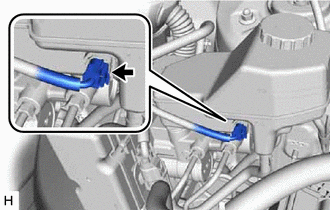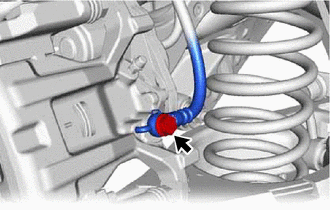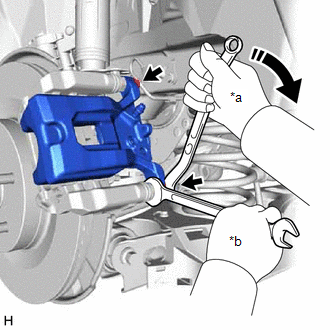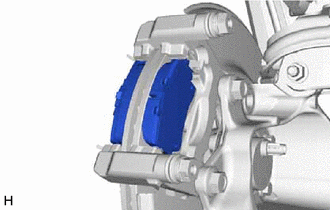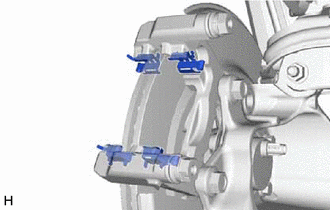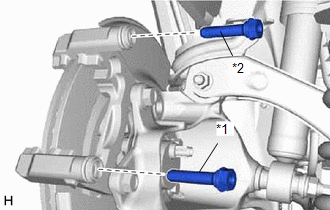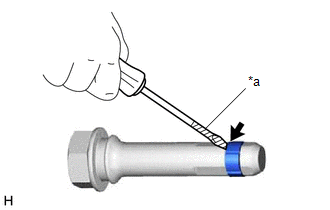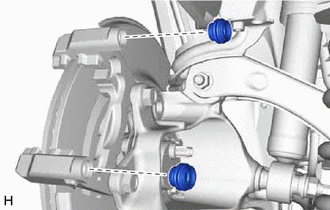| Last Modified: 01-30-2024 | 6.11:8.1.0 | Doc ID: RM1000000026Q4L |
| Model Year Start: 2023 | Model: RAV4 | Prod Date Range: [10/2022 - 10/2023] |
| Title: BRAKE (REAR): REAR BRAKE: REMOVAL; 2023 MY RAV4 RAV4 HV [10/2022 - 10/2023] | ||
REMOVAL
CAUTION / NOTICE / HINT
The necessary procedures (adjustment, calibration, initialization, or registration) that must be performed after parts are removed and installed, or replaced during rear disc brake cylinder assembly removal/installation are shown below.
Necessary Procedures After Parts Removed/Installed/Replaced (for HV Model)
|
Replaced Part or Performed Procedure |
Necessary Procedure |
Effect/Inoperative Function when Necessary Procedure not Performed |
Link |
|---|---|---|---|
| *: When performing learning using the Techstream. | |||
|
Auxiliary battery terminal is disconnected/reconnected |
Perform steering sensor zero point calibration |
Lane control system |
|
|
Parking support brake system (for HV model)* |
|||
|
Pre-collision system |
|||
|
Reset back door close position |
Power back door system (for HV model) |
||
|
Back door lock initialization |
Power door lock control system |
||
NOTICE:
- Immediately after installing the brake pads, the braking performance may be reduced. Always perform a road test in a safe place while paying attention to the surroundings.
- After replacing the rear disc brake pads, the brake pedal may feel soft due to clearance between the rear disc brake pads and rear disc. Depress the brake pedal several times until the brake pedal feels firm.
- After replacing the rear disc brake pads, always perform a road test to check the braking performance and check for vibrations.
- When removing or installing the front disc brake cylinder assembly, pushing back the disc brake piston may cause a large clearance between the brake pads and brake disc. When the brake pedal is depressed with a large clearance between the brake pads and the brake disc, DTC C140000 and/or C140A00 related to abnormal brake fluid pressure may be stored. Make sure to clear any DTCs after performing this procedure. (w/o vacuum brake booster)
- While the auxiliary battery is connected, even if the power switch is off, the brake control system activates when the brake pedal is depressed or any door courtesy switch turns on. Therefore, when servicing the brake system components, do not operate the brake pedal or open/close the doors while the auxiliary battery is connected. (w/o vacuum brake booster)
- After the ignition switch is turned off, the audio and visual system records various types of memory and settings. As a result, after turning the ignition switch off, make sure to wait at least 2 minutes before disconnecting the cable from the negative (-) auxiliary battery terminal.
- When the cable is disconnected from the negative (-) auxiliary battery terminal and the security lock setting has been enabled, multi-display operations will be disabled upon next startup unless the password is entered. Be sure to check the security lock setting before disconnecting the cable from the negative (-) auxiliary battery terminal.
HINT:
- Use the same procedure for the RH side and LH side.
- The following procedure is for the LH side.
PROCEDURE
1. PRECAUTION
2. PRECAUTION (w/o Vacuum Brake Booster)
NOTICE:
- After turning the ignition switch off, waiting time may be required before disconnecting the cable from the negative (-) auxiliary battery terminal. Therefore, make sure to read the disconnecting the cable from the negative (-) auxiliary battery terminal notices before proceeding with work.
- Make sure to read the precautions of the electric parking brake system before removing the rear brake assembly.
3. REMOVE REAR WHEEL
4. PERFORM REAR BRAKE PAD REPLACEMENT MODE
5. DISABLE BRAKE CONTROL (w/o Vacuum Brake Booster)
(a) Wait 4 minutes after turning the ignition switch off to ensure that the skid control ECU is in sleep mode.
NOTICE:
- When the brake pedal is depressed or the door courtesy switch is turned on even if the ignition switch is off, the brake control system activates. Therefore do not depress the brake pedal or open/close the doors until the reservoir level switch connector is disconnected.
- Do not operate the electric parking brake switch assembly when the electric parking brake system is in rear brake pad replacement mode.
|
(b) Disconnect the connector from the brake master cylinder reservoir assembly |
|
(c) Disconnect the cable from the negative (-) auxiliary battery terminal.
(d) In order to prevent pressurized brake fluid in the accumulator from being applied to the brake calipers, depress the brake pedal 40 times or more to return the pressurized brake fluid in the accumulator back to the brake master cylinder reservoir assembly.
(e) Check that the brake pedal cannot be further depressed.
6. DRAIN BRAKE FLUID
NOTICE:
If brake fluid leaks onto any painted surface, immediately wash it off.
7. SEPARATE REAR FLEXIBLE HOSE LH
|
(a) Remove the union bolt and gasket, and disconnect the rear flexible hose LH from the rear disc brake cylinder assembly. |
|
8. DISCONNECT NO. 2 PARKING BRAKE WIRE ASSEMBLY
9. REMOVE PARKING BRAKE ACTUATOR ASSEMBLY LH
10. REMOVE REAR DISC BRAKE CYLINDER ASSEMBLY
|
(a) Hold the 2 rear disc brake cylinder slide pins and remove the 2 bolts and rear disc brake cylinder assembly. |
|
11. REMOVE REAR DISC BRAKE PAD
|
(a) Remove the 2 rear disc brake pads from the rear disc brake cylinder mounting. |
|
12. REMOVE REAR DISC BRAKE ANTI-SQUEAL SHIM KIT
13. REMOVE REAR DISC BRAKE PAD SUPPORT PLATE
|
(a) Remove the 4 rear disc brake pad support plates from the rear disc brake cylinder mounting. NOTICE: Each rear disc brake pad support plate has a different shape. Be sure to put an identification mark on each rear disc brake pad support plate so that it can be reinstalled to its original position. |
|
14. REMOVE REAR DISC BRAKE CYLINDER SLIDE PIN
|
(a) Remove the rear No. 1 disc brake cylinder slide pin and rear No. 2 disc brake cylinder slide pin from the rear disc brake cylinder mounting. |
|
|
(b) Using a screwdriver with its tip wrapped with protective tape, remove the rear disc brake cylinder slide bushing from the rear No. 2 disc brake cylinder slide pin. NOTICE: Do not damage the rear No. 1 disc brake cylinder slide pin. |
|
15. REMOVE REAR DISC BRAKE BUSHING DUST BOOT
|
(a) Remove the 2 rear disc brake bushing dust boots from the rear disc brake cylinder mounting. |
|
16. REMOVE REAR DISC BRAKE CYLINDER MOUNTING
|
(a) Remove the 2 bolts and rear disc brake cylinder mounting from the rear axle carrier sub-assembly. |
|
17. REMOVE REAR DISC
|
(a) Put matchmarks on the rear disc and rear axle hub and bearing assembly. |
|
(b) Remove the rear disc from the rear axle hub and bearing assembly.
|
|
|
![2023 MY RAV4 HV [10/2022 - 10/2023]; PARK ASSIST / MONITORING: PARKING SUPPORT BRAKE SYSTEM (for HV Model): CALIBRATION](/t3Portal/stylegraphics/info.gif)
